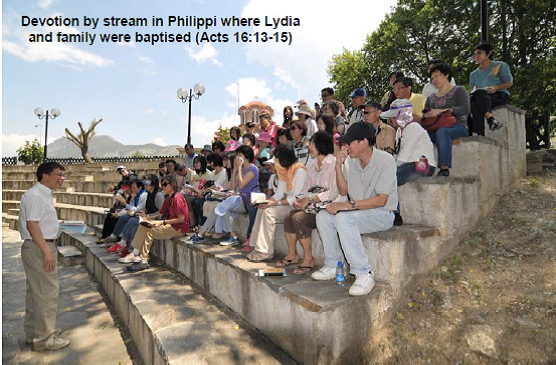A Memorable Pilgrimage
Dr and Mrs Chan Kay Heem
(Photos by Dr Chan and Testimony by Mrs Chan)
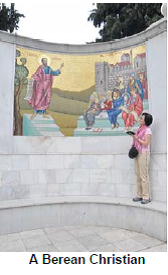
On Saturday, 21 May 2011, 46 pilgrims from eight different churches embarked on the first pilgrimage to Turkey and Greece organised by Far Eastern Bible College (FEBC). This pilgrimage, led by Dr and Mrs Jeffrey Khoo, aimed to retrace the steps of the Apostle Paul in his second missionary journey that brought him to Philippi, Thessalonica, Berea, Athens and Corinth. After seeking God’s mercies and His presence, we flew Qatar Airways to Doha and then to Istanbul, Turkey.
It was my second time I joined a pilgrimage, the first being to Israel and Jordan in November 2009. I learned many precious lessons in my first pilgrimage and so I was filled with much anticipation of what I might learn from this trip. Thank God, I was not disappointed; lessons abounded even in unlikely places like Doha where we had a city tour while waiting for our connecting flight to Istanbul.
Although forewarned of the weather, we were still unprepared for the blistering heat in Doha; at every opportunity we would seek refuge under a shade. From this experience I began to appreciate the loving kindness of our Heavenly Father for spreading a cloud for covering over the Israelites (Ps 105:39) faithfully for 40 years while they sojourned through the desert and wilderness. He understood mortal man’s physical limitations and graciously provided for our needs. Surely, ‘the LORD is my shepherd; I shall not want’ (Ps 23:1). Just as the Israelites were not ‘smitten by the sun’, He spared us from suffering heat-stroke in Doha.
Another unlikely place where I learned a precious lesson was at the Equestrian Club at Doha. I was puzzled, and still is, why we were brought to see horses. But, never mind the reason, I was simply relieved that the stables were cool. Despite the stench, we lingered in there admiring the different pedigrees of horses. Among the many handsome, regal and friendly horses were a few pale and ghostly-looking ones as well as a few speckled ones that I never knew exist. As pointed out by Rev Stephen Khoo, they fitted the description of the pale and speckled horses described in Revelation 6:8 and Zechariah 1:8 respectively. It was an eye-opening visit.
Very early morning at Istanbul, Anne and I were awoken by loud chanting. It was the Muslim’s call to prayer from nearby mosques. In fact, there were many mosques in Istanbul as 99% of the Turks were Muslims, and the rest Greek Orthodox. It was quite unimaginable that this same place was once a Christian city called Constantinople. What happened?
During Sunday morning worship, Dr Khoo explained that in the early days the Christians were sorely persecuted. Despite that, the Christians grew spiritually strong. After Emperor Constantine became a Christian— apparently through a symbol of the cross he saw in the sky—he made Christianity the national religion. Christians were no longer persecuted. Instead, they were highly regarded and given special privileges. As a result, many became ‘Christians’. These false Christians crept into the churches and later became pastors, priests and full-time workers, corrupting the Christian faith. Since then, Christianity declined. It was a sobering message. When FEBC suffered for the truth, many grew in the Word and sought Him earnestly. Now that FEBC is vindicated, will we become complacent and languish in our faith?
The same corruption to the Christian faith was also seen in Greece. In the ubiquitous Greek Orthodox Churches such as those in the Monasteries that perched precariously atop Meteora’s steep rocky summits, the ‘Christians’ worshipped icons and not our Lord and Saviour, Jesus Christ. It was quite heart-breaking—Paul’s warning ‘night and day with tears’ (Acts 20:31) had been in vain. But, thank God, He always preserves a remnant for Himself so that, even today, we could possess the pure and unadulterated faith of our spiritual fathers such as the Apostle Paul. We must treasure this old-fashioned faith and pass it to our children lest they forget.

We came to the city of Philippi of the province of Macedonia, Greece, on the third day of our pilgrimage. It stood by the highway, Via Egnatia, built by the Romans, by which Paul walked to reach Philippi from the Port of Neapolis. Thanks to the French archaeologists, a sizeable area of Philippi including the agora (or marketplace) where Apostle Paul was whipped 40 stripes saved one was excavated. Adjacent to it was the forum, a bustling city centre during Roman times, where many people would meet to hear the latest news or exchange gossip. So it must have been very humiliating to Paul to be publicly whipped. Yet, the Apostle Paul did not flinch or hold back because of persecutions. On the contrary, he said, ‘I take pleasure… in persecutions,… for Christ’s sake: for when I am weak, then am I strong’ (2 Cor 12:10). And, strengthened by the Holy Spirit, he trekked over mountains and through rough terrain from Philippi to Thessalonica and then to Berea undeterred, to preach the gospel. Reflecting on the Apostle Paul’s service to the Lord, I felt ashamed of what I have done for Christ. May God help me to be strong and be of good courage.
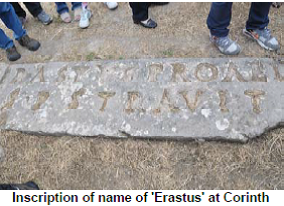
Another precious lesson I learned was that the Bible is not only perfect in doctrine but also in culture, history and geography. At Corinth, a city of the province of Achaia, the first marble step from the ancient Port of Cenchreae was fortuitously excavated with an inscription ‘Erastus’ on it. He was mentioned as ‘Erastus the chamberlain of the city’ (Rom 16:23) of Corinth from where Paul wrote the epistle to the Romans. My faith was much strengthened from this discovery; for I learned that the Bible is also perfect in history and geography. Furthermore, the many artefacts exhibited in the small museum at Corinth was proof of the Corinthians’ licentious living Paul spoke about in his letters to the Corinthians, ‘It is reported commonly that there is fornication among you’ (1 Cor 5:1). Indeed, the god of wine, party and sex—Dionysius—was worshipped in Corinth and the sin of the flesh was commonplace. God’s Word makes no mistakes even with regard to culture, and He has perfectly
preserved His Word for our edification. And, just as the Bible describes Athens as ‘a city wholly given to idolatry’ (Acts 17:16), we found out in the New Acropolis Museum that the Greeks indeed used to erect temples of worship for their many gods—Zeus, Olympus, Apollo, Athena, Artemis, Erectheus, etc. Those who claim that the Bible is only perfect in doctrine are strongly encouraged to join the next pilgrimage to Turkey and Greece!
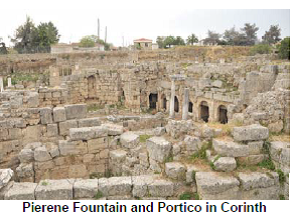
What I cherished a lot about this pilgrimage were the daily devotions especially those held at the sites where Apostle Paul had preached. The first onsite devotion was by the serene stream in Philippi where Lydia and her family were reportedly baptised. The second was at the supposedly, meat market in Corinth. The third was at the theatre at Ephesus and lastly, at Mars’ Hill (also known as Areopagus) in Athens. Onsite, the Word of God became three-dimensional—we could see, feel and smell the places where the events in the Bible took place. This experience made the gruelling schedule—waking up as early as six in the morning and arriving at the next destination as late as ten in the night and the long drives through the undulating mountainous Greece worthwhile. How else could I experience it? Particularly at Mars’ Hill, Acts 17:22 ‘Ye men of Athens, I perceive in all things ye are too superstitious’ would resonate with the Athenians. The city of Athens, infiltrated by genuinely fake Christians, remains a very superstitious and idolatrous place today.
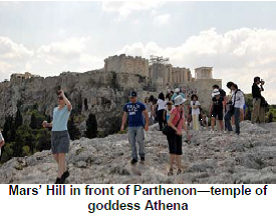
It was a blessed 11-day pilgrimage because God was with us. His unceasing care saw many pilgrims sleep in oblivion through an earthquake of magnitude 4.7 at Patra and all pilgrims were unharmed. His gracious provision enabled two lost cameras to be miraculously reunited with their owners; a forgotten backpack was found with nothing missing and much needed diabetic medicine made available for purchase over-the-counter. The warm Christian fellowship and the pilgrims’ love and concern one for another complemented the scenic drives along the coastal highway and the beautiful Grecian islands—Mykonos, Santorini and Patmos. All of these and the many lessons learned have truly made this pilgrimage memorable. We returned safely on Tuesday, 31 May 2011, physically exhausted but spiritually refreshed. Praise the Lord!
